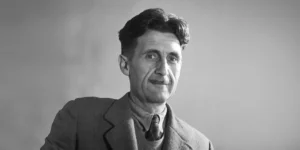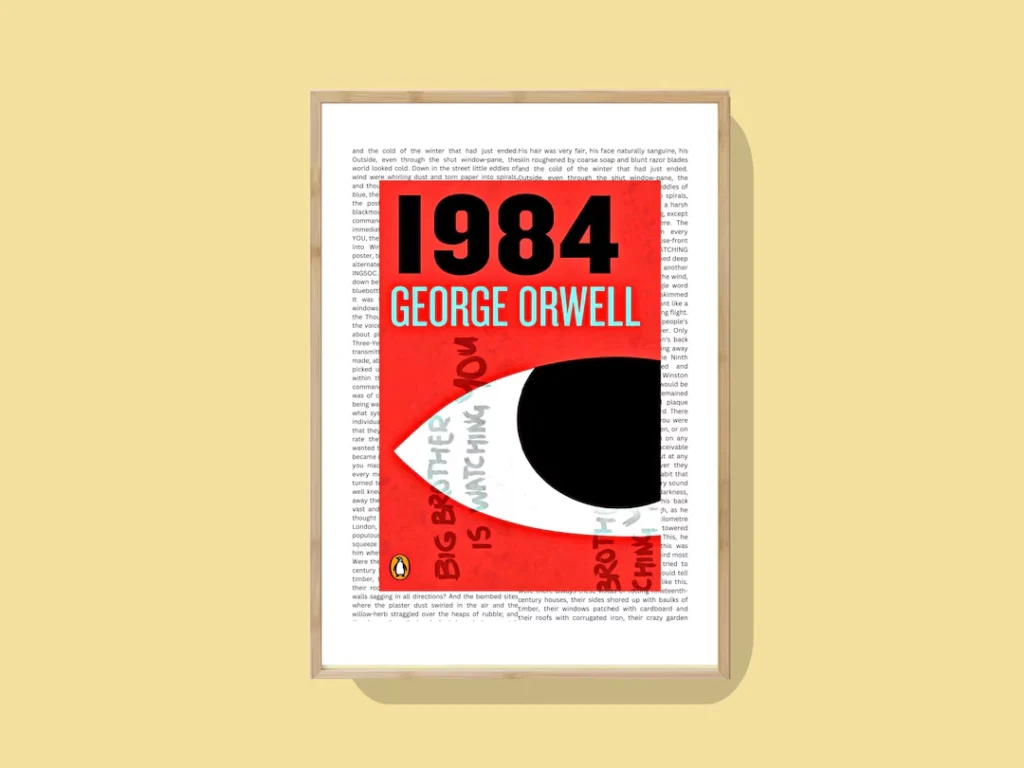The Core Details: Genre, When It Happened, and What Orwell Was Banging On About
Alright, let’s talk about George Orwell’s 1984. It wasn’t just some spooky futuristic story when it came out in 1949; it was an immediate, totally chilling warning about the post-WWII world. The genre? It’s the ultimate Dystopian Novel, a super-specific subgenre of science fiction, though there’s nothing sci-fi about the human cruelty it details.
The book is basically an x-ray of a nightmare state, Oceania, where the main character, Winston Smith, works in the Ministry of Truth, rewriting history. His little, incredibly doomed attempt at rebellion writing “DOWN WITH BIG BROTHER” in a diary, and falling in love is the whole plot. It’s simple yet totally terrifying because it feels so plausible.
- Key Context: Written shortly after WWII, with the Soviet Union’s rise (Stalinism) and the chilling memory of Nazism fresh in everyone’s mind. Orwell wasn’t predicting the year 1984; he was warning about the system he saw forming.
- Literary Vibe: It’s a dark, intensely psychological exploration that borrows heavily from political essays (Orwell was a journalist, remember) but uses fiction to make the warning stick.
The Big Brain Stuff: The Philosophy and Themes That Make 1984 Tick
The ideas here are not just political; they are epistemological (about what we know) and linguistic (about language). These concepts didn’t just appear out of nowhere; they were ripped right from the headlines of Stalin’s purges and propaganda machines. That’s totally nuts.
Here are the absolutely essential, massive concepts Orwell introduced or defined forever:
| Key Orwellian Concept | The Real-World Impact (Why We Still Talk About It) |
| Big Brother | The omnipresent, unseen dictator. Represents the idea of totalitarian power that watches you constantly, regardless of whether a single person is actually “Big Brother.” It’s pure, crushing surveillance. |
| Newspeak | A deliberately shrunken language designed to make rebellious thought (Thoughtcrime) literally impossible. If you can’t say it, can you even think it? This is a terrifying idea about controlling consciousness via vocabulary. |
| Doublethink | The ability to hold two totally contradictory beliefs in your mind at the same time and accept both of them. It’s what lets the Party say “War is Peace” and everyone nods. It’s mental submission, pure and simple. |
| The Memory Hole | Not a physical place, really (well, it is too), but the process of instantly erasing historical records so the past only exists as the Party wants it to. Controlling the past controls the future, man. |
The philosophical content? It’s basically a relentless argument that truth is the ultimate rebellion.

Orwell’s Footprint: How 1984 Shaped the Global Stage
The Echoes of Oceania: Why This Book Changed Dramaturgy and Media
The influence of 1984 is absolutely wild because it’s not just literary; it became a manual for writing about power, anxiety, and surveillance in film, theatre, and even pop music. Its immediate impact on drama was profound because it introduced the theme of the solitary rebel against the overwhelming, faceless system, which is just inherently dramatic.
The book’s techniques the constant sense of being watched, the chilling minimalism of the setting demanded a new kind of stark, unsettling visual and dramatic language. 1984 taught writers how to build suspense not through action, but through psychological dread.
- On Direction: It popularized the use of omnipresent screens (telescreens) and minimalist, brutalist architecture to represent state control. Every dystopian movie ever made has borrowed from this visual vocabulary.
- Theatrical Tension: It relies on very long, tense dialogues like the torture scenes in the Ministry of Love which changed how writers approached stage tension. It’s slow burn terror, not explosions.
Must-See Adaptations: 1984 On Film, Stage, and Beyond
There are quite a few versions, but adapting this book is totally difficult, mostly because the best stuff is inside Winston’s head (the inner monologue). But when they nail it, it’s chilling.
Notable Adaptations and Their Takes:
| Adaptation Type | Key Example/Details | Why It’s Famous/Relevant |
| The 1956 Film | Directed by Michael Anderson. An early black-and-white effort that captured the initial post-war paranoia perfectly. | Showed how immediately powerful the visuals of Big Brother were, even with limited effects. |
| The 1984 Film | Directed by Michael Radford, starring John Hurt. Filmed in color, but deliberately grim and desaturated. | Released in the titular year! It’s considered the most faithful adaptation, right down to using the bleak, grimy atmosphere the book implies. |
| Modern Operas/Plays | Various stage versions continue to be produced globally, focusing heavily on projections and surveillance tech. | Proves the text’s enduring power; the story translates because the feeling of being watched is just universal now. |
| Pop Culture References | The Apple Macintosh commercial in 1984, the rise of reality TV (which is basically Big Brother), every single conspiracy theory movie since. | The book’s imagery has entered the global cultural shorthand; you don’t even have to read it to get the reference. That’s a huge legacy. |
Learning from Oceania: Essential Study Materials
Why University Students Must Read This Book
If you’re studying politics, literature, communication, or history, 1984 is not optional; it’s totally mandatory reading. It is, perhaps, the single best blueprint we have for understanding how a totalitarian regime maintains power, not just through brute force, but through controlling the very tools of reality: language and memory.
- For Political Science: It provides a perfect model for analyzing the mechanisms of power maintenance, cults of personality (Big Brother), and the psychology of submission.
- For Communications/Journalism: It makes the case, more powerfully than any textbook ever could, for the absolute necessity of an objective truth. It’s an ethics lesson on the dangers of propaganda and the erasure of facts.
- For Literature: It’s a masterclass in using metaphor and world-building (dystopia) to create urgent political commentary.
What to Read Next: Further Deep Dives
Once you’ve finished that heavy, depressing, yet ultimately necessary read, you’ll probably want to explore other works that either influenced Orwell or were totally influenced by him.
| Recommended Reading | The Direct Connection to 1984’s Themes |
| Animal Farm (Orwell) | Shorter, simpler, but the exact same political analysis of how a revolution can be corrupted into a brutal dictatorship (specifically, the Soviet one). It’s the allegory for the system 1984 describes. |
| Brave New World (Aldous Huxley) | The other great dystopian novel. Where 1984 controls people through pain and fear, Brave New World controls them through pleasure and distraction. A great comparison point. |
| We (Yevgeny Zamyatin) | This Russian novel from the 1920s is often considered the original blueprint for 1984. It features glass buildings, absolute conformity, and the idea of humans as numbers. Orwell totally read it. |
Wrapping Up: The Shadow of 1984 Today
So, where does that leave us? George Orwell’s 1984 remains utterly central to modern culture, not because the specific year came and went, but because the mechanisms of control he detailed surveillance, manipulation of language, the denial of truth have just become more sophisticated, not less. Every time we worry about privacy (thanks, cameras) or political spin (thanks, Newspeak), we are, in a very real way, living in Orwell’s shadow.
It’s an absolutely timeless work.
- The theatre will always return to it because the high-stakes confrontation between the individual and the monolithic state is inherently dramatic.
- The students will always be assigned it because understanding how power works is the first step toward dismantling it.
It serves as a permanent, chilling warning to always question who controls the narrative. That’s why it endures.

